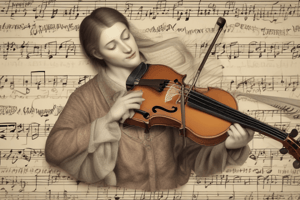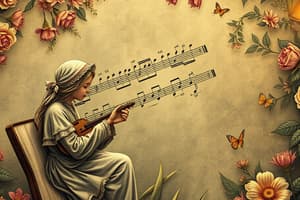Podcast
Questions and Answers
What time period does Classical music refer to?
What time period does Classical music refer to?
- 1800-1900
- 1750-1825 (correct)
- 1600-1750
- 1900-1950
How is Classical music characterized?
How is Classical music characterized?
by instrumentals, called 'absolute music'
What is absolute music?
What is absolute music?
music that is not derived from something outside itself
Define thematic development in music.
Define thematic development in music.
What is the sonata cycle?
What is the sonata cycle?
What is sonata-allegro form?
What is sonata-allegro form?
What are the sections of the sonata form?
What are the sections of the sonata form?
What characterizes the first movement of a sonata?
What characterizes the first movement of a sonata?
What is the general mood of the second movement in sonatas?
What is the general mood of the second movement in sonatas?
Describe the third movement in sonatas.
Describe the third movement in sonatas.
What is the typical mood for the fourth movement of a sonata?
What is the typical mood for the fourth movement of a sonata?
What is a rondo in music?
What is a rondo in music?
What does ABABA represent in musical form?
What does ABABA represent in musical form?
What does ABACA indicate in musical structure?
What does ABACA indicate in musical structure?
Define classical chamber music.
Define classical chamber music.
What instruments are typically found in a string quartet?
What instruments are typically found in a string quartet?
What is a duo sonata?
What is a duo sonata?
What defines classical symphony?
What defines classical symphony?
What is Beethoven's contribution to symphonies?
What is Beethoven's contribution to symphonies?
What characterizes a classical concerto?
What characterizes a classical concerto?
Flashcards are hidden until you start studying
Study Notes
Classical Music Overview
- Time period: 1750-1825, marking the Classical era in music history.
- Characterized by instrumental focus, known as "absolute music," meaning compositions are self-contained.
Musical Concepts
- Absolute Music: Independent music not derived from external narratives or themes.
- Thematic Development: Techniques include repetition, expansion, fragmentation, and recombination to create variations of a theme.
- Sonata Cycle: Framework structuring multi-movement works, prevalent in Classical compositions.
Sonata Form
- Sonata-Allegro Form: Structure commonly used in the first movements of sonatas, comprising exposition, development, and recapitulation sections.
- Key Structure: Typically follows a 'home, abroad, home' pattern, returning to the original key.
- Theme Structure: Involves a statement, development, and restatement.
Movement Characteristics
- First Movement: Fast tempo (Allegro), epic and dramatic mood, structured in sonata-allegro form.
- Second Movement: Slower tempo, contrasting key, varied forms like A-B-A or theme and variations, generally more lyrical.
- Third Movement: Often a minuet and trio in 3/4 meter, varying tempo, typically returns to the first movement's key.
- Fourth Movement: Fast tempo (Allegro, Presto, Vivace), lively mood, varied forms like rondo or theme and variations.
Rondo Forms
- Rondo ABABA: Features one contrasting episode; an extension of ternary (ABA) form.
- Rondo ABACA: Incorporates two contrasting ideas.
- Rondo ABACABA: Broader structure that creates an arch-like formation.
Chamber Music
- Golden age during Classical era, composed for small ensembles (2-10 players) with equal treatment of instruments.
- String Quartet: Comprised of two violins, a viola, and a cello.
- Duo Sonata: Typically features a piano paired with another instrument like violin or cello.
- Trio: Consists of piano with one other instrument, often violin and cello.
- Quintet: Usually includes strings and woodwinds or a string quartet with piano.
- Divertimento and Serenade: Genres of lighter, social music blending elements of symphony and chamber music.
Notable Composers
- Mozart: Noted for compositions like "Eine Kleine Nachtmusik."
- Haydn: Renowned for "String Quartet Opus 76 No. 3, Emperor."
- Beethoven: Influential across three stylistic periods; composed 9 symphonies, 32 piano sonatas, concertos, and chamber works.
Beethoven's Contributions
- Pioneered the symphony with expanded dimensions, thematic development, and the introduction of the scherzo instead of the traditional minuet.
- Significant expansion of orchestral size, incorporating instruments such as clarinet, trombone, piccolo, and double bassoon.
- Classical Concerto: Features a virtuosic soloist (often piano or violin) complemented by the orchestra.
Studying That Suits You
Use AI to generate personalized quizzes and flashcards to suit your learning preferences.




